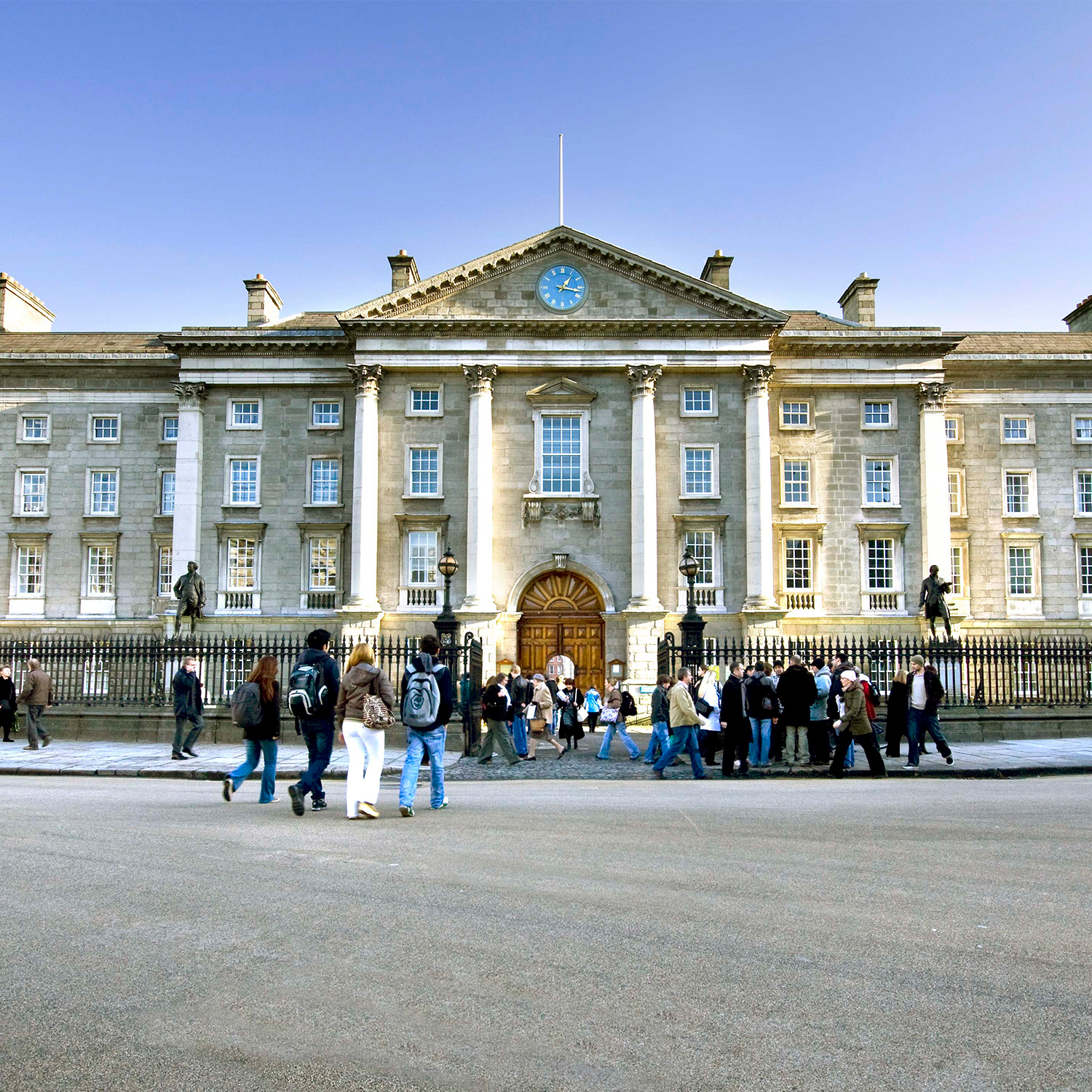Malaysia
Malaysia
Welcome to Trinity College Dublin, Ireland’s leading university. Prospective students from Malaysia can discover more about Trinity including contacts and equivalent entry qualifications for undergraduate and postgraduate study below. You can also register your interest to find out more.
International Foundation Programme Entry Requirements
Our International Foundation Programme is aimed at students who have the drive and ambition to attend a world-class educational institute, but cannot begin an undergraduate degree directly. Our International Foundation Programme is a year-long programme designed to allow students to develop the skills required to succeed and excel in a competitive university environment. To find out more about the Trinity International Foundation Programme, please visit this page.
To apply to the International Foundation programme, you will need:
English requirements:
- IELTS 5.0 with 5.0 in writing with no element below 4.5
- Duolingo English Test: minimum overall score of 80/160
English requirements for Law, Pharmacy and Psychology:
- IELTS 6.0 with no band below 5.5
- Duolingo English Test: minimum overall score of 90/160
Academic requirements:
- SPM (Malaysia Certificate of Education) Grade B average in best five relevant academic subjects including English and Mathematics.
Undergraduate Requirements
Trinity is delighted to accept students from Malaysia who have completed one of the international qualifications recognised by Trinity which are detailed below.
STPM 3 subjects: A-BB to AAA-
or
4 subjects: BBBB to AAAA-
UEC - Average Grade of 6 best relevant subjects from B3 minimum to A1
Accepted qualifications for direct applications include:
- GCE A Levels
- International Baccalaureate
- US High School Diploma with SAT or ACT
More information about accepted qualifications and entry requirements can be found in our Undergraduate Admission Guide for non-EU students.
If you do not have any of these qualifications, you may join Trinity through our International Foundation Programme.
In addition, to qualify for admission to a degree course at the University you must:
- Meet the minimum matriculation requirements (pass grades in English, Mathematics, a language other than English, and a full set of valid subjects for your examination system)
- Display a high level of competence in the English language in one of the examination systems recognised by Trinity College Dublin. Details on accepted English proficiencies are available here.
- Satisfy course specific requirements. Some courses will have additional requirements and restrictions for admission. They are detailed on the relevant course page.
- Meet competitive standards for admission to the course.
Please note that posted scores are minimum entrance requirements only and do not guarantee admission. Where places are competitive, a student must have excellent examination results to qualify for a place on their preferred course.
These standards are indicative only and final assessment will be made by Trinity's Academic Registry.
Important note on your application
Applicants from your country will normally be defined by Trinity as Non-EU applicants; this is based on residency rather than nationality.
Your EU/Non-EU status is an important part of your application and it is your responsibility to determine your correct status before making an application, as the method of application and requirements will differ.
Determining EU/Non-EU status (Undergraduate)
Making an Application
For detailed information on how to make an application to study at Trinity College Dublin, please see our How to Apply Guide.
There are many different ways to come to University and Trinity encourages applicants from all backgrounds and circumstances to apply. For more information on alternative paths to Trinity, such as advanced entry transfers please see our guide to non-standard applications here
Postgraduate Entry Requirements
Postgraduate work in Trinity is academically challenging and the University has high academic entry requirements.
Applicants will need to:
• hold at least a 2.1 honors degree from an Irish university or equivalent result from a university in another country.
Determining EU/Non-EU Status (Postgraduate) The fees you will be expected to pay to attend Trinity College Dublin are determined by a number of factors. For more information on how to determine your course fees, and methods of payment, please see our detailed information on Fees and Finances. Undergraduate Fees and Finances Postgraduate Fees and Finances For more information on scholarship, funding and grant opportunities, please see below. General Undergraduate Scholarships and Funding General Postgraduate Scholarships and Funding Scholarships for International Foundation Programme Study Do I need a Visa to come to Ireland to study at Trinity? The majority of non-EU/EEA students require a visa before entry to Ireland. To check to see whether you require a visa, please see here. Please see on the Irish Immigration Service website a list of the countries that require a visa before entry to Ireland. Trinity in your Country We are not travelling actively at the moment but we are always happy to help answer questions about our programmes, entry requirements and student life. You can find contact details for your regional representative in the "Contact us" section below. Any visits to your region are listed on this page. Education Agents Trinity works with education agents who can assist you with your application. Here is the list of our approved agents in your country: AECC Global Malaysia Agra Education AUG Students Services Irish Universities & Medical Consortium (IUMC) JM Education MABECS Global Mystudy Education Consulting SI-UK Study Hub Advisory UKEC
• display a high level of competence in the English language in one of the examination systems recognised by Trinity College Dublin. Details on accepted English proficiencies are available on our Admission Requirements page
Some courses may require higher standards or require you to take further tests or attend an interview. More detailed requirements for each course are listed on the relevant course page
If you have questions about the specifics of the admission requirements for a given course, or about the course itself, you should contract the course coordinator directly using the contact information available on the courses page.Fees, Funding, Scholarships
Trinity College Dublin offers a number of scholarship opportunities for prospective and current students interested in study or research at Ireland's leading university. Since its foundation in 1592, Trinity College Dublin has sought to assist students of limited means and reward academic achievement. Students are always encouraged to explore external funding options in their home countries.Visas
For general information on visas and immigration please visit our Visa Information section.Meet us in your country
www.aeccglobal.my/contact-us
obeduc.org
augstudy.com/malaysia/contact
www.iumcireland.com
www.jmeducationgroup.com/
mabecsglobal.com
www.mystudy.my
studyin-uk.com/malaysia/
studyhub.my
www.ukec.com.my
Contact us
Student Testimonials
-
 Wan Qi PangMSc Operations and Supply Chain Management
Wan Qi PangMSc Operations and Supply Chain Management
I enjoy meeting new friends from different countries. I love the diversity in people and cultures in Trinity. This enables me to explore and experience Ireland as well as other European countries. There are tons of societies and events in Trinity that provide opportunities for you to socialise and interact with people that share the same interests and hobbies as you. -
 Edward NgLaw (LL.M. in Intellectual Property and Information Technology Law)
Edward NgLaw (LL.M. in Intellectual Property and Information Technology Law)
Ever since my first visit to Trinity back in 2017, I have been captivated by the seamless blend of historical and modern elements of the stunning campus. It is always filled with buzz, excitement, and vibrance. The strategic location of the campus at the very heart of the city is also an unparalleled convenience. On the soil of Trinity, students are showered with opportunities to grow intellectually, socially, and professionally.





